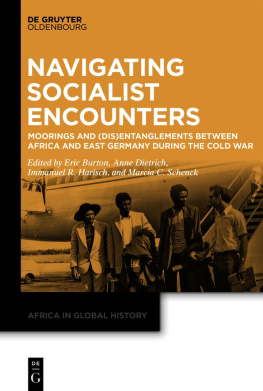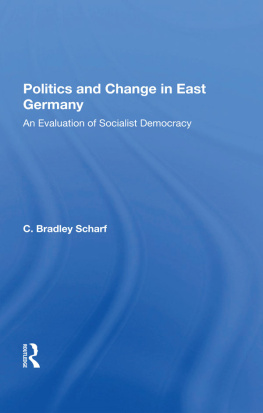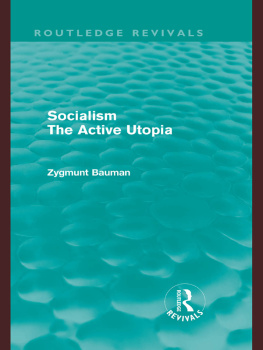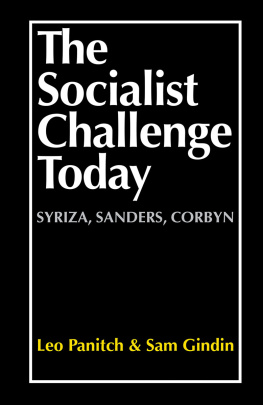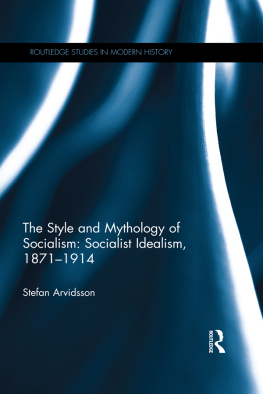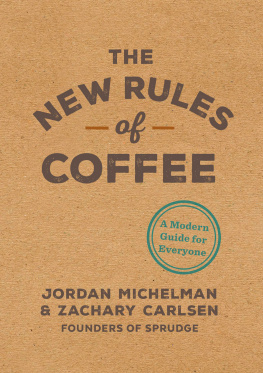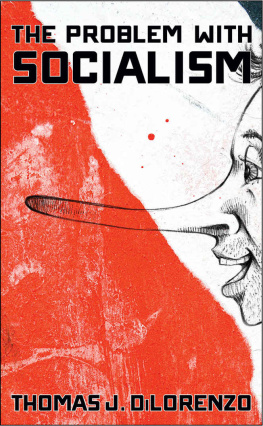ABBREVIATIONS
ABI | Abteilung fr Leicht-, Lebensmittel-und Bezirksgeleitete Industrie des Zentralkomitee der SEDDepartment for Light, Food-, and District-Led Industries of the Central Committee of the Socialist Unity Party |
AHB | AuenhandelsbetriebEast German Foreign Export Company |
BZ | Berliner Zeitung |
C.A.R.E. | Cooperative for American Remittances to Europe |
CMC | Ethiopian Coffee Marketing Corporation |
COMECON | Council for Mutual Economic Aid (or CMEA) |
DM | Deutsche MarkWest German currency |
DRL | Democratic Republic of Laos |
FDGB | Freier Deutscher GewerkschaftsbundFree German Trade Union |
FDJ | Freie Deutsche JugendFree German Youth |
FNLA | Frente Nacional de Libertao de AngolaNational Front for the Liberation of Angola |
FRG | Federal Republic of Germany |
GATT | General Agreement on Tariffs and Trade |
GENEX | Geschenkdienst und Kleinexport GmbH |
GDR | German Democratic Republic |
HO | HandelsorganisationenEast German state-owned retail chain |
IACA | Inter-American Coffee Agreement |
IBC | Instituto Brasileiro do CafBrazilian Coffee Institute |
ICA | The International Coffee Agreement |
ICO | International Coffee Organization |
IfM | Institt fr MarktforschungInstitute for Market Research |
KoKo | Bereich Kommerzielle KoordinierungDepartment of Commercial Coordination |
MBL | Ministerium der Bezirksgeleitete Industrie und LebensmittelindustrieMinistry of District-Led Industry and Foodstuffs Industry |
MfA | Ministerium fr AuenhandelEast German Foreign Trade Ministry |
MfS (Stasi) | Ministerium fr StaatssicherheitMinistry for State Security, STASI |
MHV | Ministerium fr Handel und VersorgungMinistry for Trade and Supply |
MPLA | Movimento Popular de Libertao de AngolaPeoples Movement for the Liberation of Angola |
MR | MinisterratCouncil of Ministers |
NSDAP | National Socialist German Workers Party |
NS | Neues konomisches SystemNew Economic System |
NYCSE | New York Coffee and Sugar Exchange |
SED | Sozialistische Einheitspartei DeutschlandsSocialist Unity Party of Germany |
SPK | Staatliche PlankommissionState Planning Commission |
SRV | Sozialistische Republik VietnamSocialist Republic of Vietnam (North Vietnam) |
StaKo | Staatliches Kontor fr pflanzliche Erzeugnisse der LebensmittelindustrieState Controller for Vegetable Products of the Food Industry |
UESP | Unity of Economic and Social Policy |
UNITA | Unio Nacional para a Independncia Total de AngolaNational Union for the Total Independence of Angola |
VEB | Volkseigener BetriebPeoples Own Enterprise |
VM | ValutamarkEast German measurement for foreign currency equivalency |
WSLF | Western Somali Liberation Front |
ZIDA | Zentrum fr Information und Dokumentation der AuenwirtschaftCenter for the Information and Documentation of Foreign Trade |
ACKNOWLEDGMENTS
A book is the product of a sole author, but it would hardly exist at all were it not for the support and encouragement of many people along the way. I am extremely grateful to the community of family, friends, and colleagues on whom I have been able to rely these past years. First and foremost, I owe so much to Pamela Swett, without whose mentorship, patience and support this book would not be in your hands now. Thank you also to my partner in life, Chelsea Barranger, for your love, encouragement, and endless patience, as well as for reading and providing feedback on this manuscript. I am so fortunate to have you by my side for this project and beyond.
Thanks are also due to Richard Wetzell and the German Historical Institute (GHI) in Washington, D.C., for the opportunities they provided to showcase and publish my work; I am proud to have this book join their Studies in German History series. Thank you to Patricia Sutcliffe at the GHI, and to Sulaiman Ahmad and Keara Hagerty at Berghahn Books, for their extensive advice and assistance in preparing this manuscript for publication. Both of you made this experience an absolute joy.
This book originated as a Ph.D. dissertation, which I completed at McMaster University in Canada. I am grateful to the faculty and staff of the History Department and Humanities offices at McMaster, especially Wendy Benedetti; Stephen Heathorn; Martin Horn; Debbie Lobban, and Tracy McDonald. I was fortunate in having the financial support needed to cover the research and travel expenses for this project. In this regard, I wish to offer my thanks to the German Academic Exchange Service (DAAD) and McMaster University for their generous financial contributions. Some of the ideas of this booknotably elements of chapters two, four and fiveappeared previously in Brewing Global Relations During the Cold War: Coffee, East Germans, and Southeast Asia, 19781990, published in Food and Modern Warfare in Germanys Global Century, edited by Heather Benbow and Heather Perry (Palgrave MacMillan, 2019), and Brewing Relations: Coffee, East Germans, and the World, 19771989, in a special issue of Gastronomica: The Journal of Critical Food Studies (17, no. 4, 2017).
In Germany, I owe no small debt of gratitude to Thomas Wenzel, who offered both his home and his friendship to me while I conducted my research in Germany. I miss our afternoon conversations about life, music, coffee, and politics. The staff and archivists at the Federal Archives of Germany (Bundesarchiv Lichterfelde) and the archives of the former East German Secret Police (Bundesbeauftragte fr die Stasi-Unterlagen des Staatssicherheitsdienstes der ehemaligen Deutschen Demokratische Republik, BtSU) were always helpful, and I thank them for their guidance and knowledge, notably Sven Schneidereit at Lichterfelde and Jeannette Madarasz-Lebenhagen at BStU. Thank you as well to the scholars in Germany who provided valuable advice and guidance during my research: Thomas Lindenberger; Andreas Ludwig; Matthias Judt. Thank you to Swen Kernemann-Mohr, owner of Bibliotheca-Culinaria bookstore in Berlin, for graciously granting access to his vast collection of East German culinary literatureand especially for the friendly conversations over coffee.


